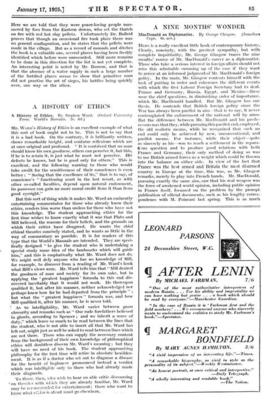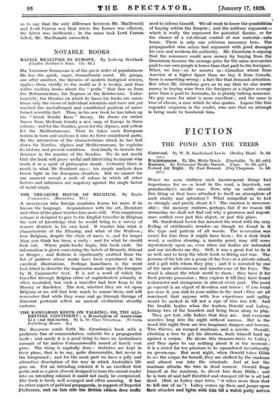A NINE MONTHS' WONDER
HERE is a really excellent little book of contemporary history. Clearly, concisely, with the greatest sympathy, but with complete impartiality, Mr. George Glasgow traces the nine months' course of Mr. MacDonald's career as a diplomatist. Those who take a serious interest in foreign affairs should not miss this admirable summing up of the case if they want to arrive at an informed judgment of Mr. MacDonald's foreign policy. In the main, Mr. Glasgow contents himself with the task of putting in order and coherence the different events with which the first Labour Foreign Secretary had to deal. France and Germany, Russia, Egypt, and Mexic6—these were the chief questions, in diminishing order of importance. which Mr. MacDonald handled. But- Mr. Glasgow has one thesis. He contends that British foreign policy since the War has always been pacifist in aim—that is to say, it never contemplated the enforcement of the national will by arms. But the difference between Mr. MacDonald and his prede- cessors was that they, while pursuing this pacifist end, employed, the old realistic means, while he recognized that such an end could only be achieved by new, unconventional, and pacifist means. For instance, while their object—quite as sincerely as his—was to reach a settlement in the repara- tens question and to produce good relations with both France and Germany, their only method of doing so was to use British armed forces as a weight which could be thrown into the balance on either side. In view of the fact that France was the best armed and Britain the most disarmed
country in Europe at the time, this was, as Mr. Glasgow remarks, merely to play into French hands. Mr. MacDonald, pursuing exactly the same aim, saw that his real weapon was the force of awakened world opinion, including public opinion in France itself, focussed on the problem by the prompt publication of official documents, such as his lengthy corres- pondence with M. Poineare last spring. This is as much
as to say that the only difference between Mr. MacDonald and Lord Curzon was that where the former was efficient, the latter was inefficient ; in the same task Lord Curzon failed, Mr. MacDonald succeeded.











































 Previous page
Previous page